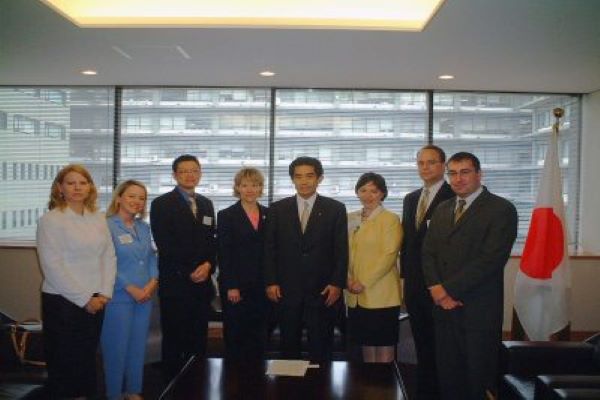Seven senior Congressional staff visited Japan during the week of August 8–15, 2004, as part of the 18th delegation of the US Congressional Staff Exchange Program. During their visit, they met with the leadership of Japan’s major political parties, business and governmental leaders, and other experts to discuss US-Japan relations, regional community building, and other pressing foreign policy issues. They were also briefed on Japan’s policymaking process and its political and economic prospects by a wide range of policymakers and analysts, and they participated as speakers in a widely attended public symposium.
A month after the successful showing of the Democratic Party of Japan (DPJ) in Upper House elections reinforced moves toward a two-party system, delegation participants heard about recent changes in Japan’s policymaking process from leaders from all of the major political parties. Katsuya Okada, the DPJ’s new president, explained how structural shifts in Japanese politics have made his party a viable alternative to the ruling Liberal Democratic Party (LDP) and sketched out the two parties’ policy differences with a special focus on the DPJ’s support for greater local autonomy and the further decentralization of policymaking. In a meeting at LDP headquarters, Deputy Secretary-General Hakubun Shimomura spoke about the evolution of party politics in recent years and the ways in which the locus of policymaking has been shifting from the bureaucracy toward elected political leaders. Meanwhile, Diet members from the New Komeito Party, the LDP’s coalition partner, explained how their party’s priorities of welfare and education can be pursued through their participation in the ruling coalition with the LDP.
The nuts and bolts of Japan’s policymaking process were taken up in a roundtable session with 12 senior policy staff from the various parties’ headquarters and from Diet members’ personal offices. The Japanese staffers explained that most Diet members only have one aide to cover all policy issues and discussed the constraining influence this has had as Diet members have played an increasingly prominent role in policymaking. Both the American and Japanese participants expressed their hopes that the roundtable could be expanded in order to explore common concerns in greater depth, perhaps being made the centerpiece of a reciprocal Diet staffer visit to the United States.
The decentralization of governmental authority and the growth of local autonomy was raised as a key issue in many of the discussions with other leaders. Chiba Governor Akiko Domoto explained that, while the national government has promoted greater local autonomy in name, it has struggled to maintain control over tax revenues, which has hampered the true decentralization of power. During a day of site visits in Chiba Prefecture, it became clear that prefectural and local-level government officials have been trying to take the initiative in introducing innovative new policies, a marked departure from the traditional model of Japan’s central government-led policymaking.
The evolving role of the US-Japan relationship in the regional and global context was the focus of many of the group’s meetings. A deep concern about the war in Iraq was one recurrent theme. Senior Vice Minister of Foreign Affairs Ichiro Aisawa and others emphasized the importance of the participation of Japanese Self Defense Forces in Iraq, but discussions with a range of political leaders made it clear that there is considerable opposition to the dispatch, even among members of the ruling coalition parties. Meanwhile, the growing prominence of China was cited repeatedly as Japan’s most central foreign policy concern over the long term. As one senior political leader put it, the greatest foreign policy challenge facing Japan is maintaining good relations with China while keeping the US-Japan alliance intact.
A number of political leaders and government officials also spoke about the growing sense that the future of East Asia lies in nurturing a sense of regional community that will encourage greater cooperation in the areas of trade, finance, and nontraditional security. Although some of the delegation members expressed a degree of skepticism, having seen some previous Asian community-building initiatives fail to materialize, a wide range of Japanese policymakers insisted that regional community building is a real phenomenon and is moving forward, even if US foreign policy analysts have not been paying much attention to this trend.
In a change from previous years, this year’s delegation was selected by an advisory board consisting of former members of Congress who reviewed all the delegates’ applications. This was reflected in the remarkably high quality of the participants, and for this we owe special thanks to the board members, Speaker Thomas S. Foley, Congressman Bill Frenzel, and Congressman David Skaggs.
Participants
AMY ANGELIER, Senior Analyst, Senate Budget Committee (Majority Office)
ROCK CHEUNG, Junior Analyst, Senate Budget Committee (Minority Office)
PATRICIA LAWLER, Legislative Assistant, Rep. Bob Etheridge (D-NC)
MICHAEL MORAN, Legislative Assistant, Sen. Craig Thomas (R-WY)
PAULA NOWAKOWSKI, Staff Director, House Committee on Education and the Workforce (Majority Office)
JANET NUZUM, Senior Policy Advisor, Rep. Cal Dooley (D-CA)
STEVEN PERROTTA, Senior Legislative Assistant, Rep. Amo Houghton (R-NY)
Our gratitude also goes out to the Starr Foundation, which has generously supported the US Congressional Staff Exchange for many years and without which this visit could not have been possible.

